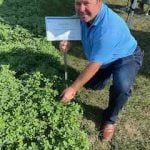WRONG ANALYSIS
Re: European trade deal over hyped, says group (WP March 7)
In Barry Wilson’s article, National Farmers Union Alberta co-coordinator Jan Slomp suggests that the benefits of increased European Union trade access though the Canada-EU comprehensive economic and trade agreement (CETA) are being over-hyped. This analysis is wrong. The Canada-EU CETA has the potential to increase trade across Canada’s agri-food industry, including the beef and pork sectors.
It is true that Canada currently has a very small amount of access to the EU for beef and pork and that access is not being fully used. That is the very point of negotiating a free trade deal.
Read Also

Worrisome drop in grain prices
Prices had been softening for most of the previous month, but heading into the Labour Day long weekend, the price drops were startling.
For four years, Canada’s negotiators, supported by organizations like the Canadian Agri-Food Trade Alliance and its members, have been working to secure access to the EU that provides benefits to Canada’s agri-food industry and that, in addition to securing commercially meaningful access, address issues like quota administration and regulatory issues that block trade.
With respect to existing beef and pork quotas to the EU, Mr. Slomp fails to note that the existing quota is mired in complexities that make it difficult to utilize.
Existing pork quotas have very high duty rates and quota administration requirements that are unnecessarily complex and make much of the quota inaccessible.
On the beef side, the quota is highly prescriptive and, like pork, Canadian plant approvals are difficult and costly to obtain, discouraging the necessary investment by Canadian companies.
These are the very issues the CETA aims to address. Recent free trade agreements the EU has negotiated (e.g. Chile, Mexico) have provided tariff quotas with low or zero tariffs and much easier administrative rules with the result that these quotas are being filled; exactly as we are expecting to do with the access Canada is able to negotiate.
CAFTA and its members, including the Canadian Cattlemen’s Association, the National Cattle Feeder’s Association, Alberta Beef Producers, Alberta Cattle Feeder’s Association, Canadian Pork Council, Canada Pork International and the Canadian Meat Council are working with Canadian trade negotiators to secure a solid and beneficial deal for Canada’s agri-food sectors. They, together with CAFTA and CAFTA’s full membership, are working overtime to secure a trade deal that works for Canadian farmers.
Kathleen Sullivan,
Executive Director, CAFTA,
Ottawa, Ont.
FARM VOICES
Recently one Danny Penner has been advocating for one “super” farm group to speak with one voice. It’s not a novel idea and has been around for as long as there have been farmers.
Previously, many farmers thought the Pools and the Canadian Wheat Board, which had farmer-elected directors and delegates, were the spokespeople for farmers.
But this government, many industry members and some farmers felt these groups were not needed.
They believed the industry would look after us and often contended a strong industry leads to prosperous farmers.
Mr. Penner states, “While it is widely agreed that changes in an open market will continue to benefit producers …” It seems ironic he also contends a super group is needed in an open market that he thinks will benefit producers.
He can’t have it both ways.
He also states, “If Canadian farmers want to maintain control of the agriculture industry, they need to work to form a unified voice.”
What he has missed is that Canadian farmers presently do not control the agriculture industry.
Many of the present groups are ineffective as farmer voices and they have been infiltrated by the industry and in some cases industry representatives even sit on the executives of these groups.
Many farmers will not even belong to a farm group as they feel they are unnecessary and too expensive. Most farmers strongly supported the single voice they had with the Pools and the CWB, but too many were too shortsighted to see the importance of a single independent voice.
Industry and farmers will never have the same vision or voice. Farmers certainly need an independent voice to balance industry power, but we will not find that in the current crippled commodity and Astroturf groups.
Eric Sagan,
Melville, Sask.
DROUGHT SUPPORT
To the Editor:
When it comes to addressing the devastating effects of desertification and drought in developing countries, our focus should be on initiatives that make a measurable difference in people’s lives, including in drought-stricken regions of the world, rather than giving money to an organization where little of Canada’s investment was going to address drought.
For instance, Canada helps smallholder farmers throughout Africa produce food, increase their incomes and become more sustainable. Building the capacity of developing countries to respond to weather-related challenges is essential to reducing poverty and the vulnerability of populations.
Canada has also supported the Productive Safety Net Program in Ethiopia, which has helped feed 7.6 million people while at the same time addressing underlying causes of food insecurity through construction of soil conservation structures and tree-planting.
This program helped to ensure that the 2011 drought in eastern Africa did not become a crisis in Ethiopia on the scale seen in neighbouring countries.
These are only a few among many examples of tangible results that people who live in drought-stricken areas of Africa deserve, and that Canadians expect from their investments in international development.
Julian Fantino,
Ottawa, Ont.
HIGH PRAISE
Re: Juggling cattle operation with family a balancing act (WP Feb. 21)
I don’t write to criticize, I write to praise.
As a student, I often learn more about the negative aspects of agriculture than the positive ones. In class, we learn of the challenges of starting a farming operation, the decrease in family run farms in Canada, and the toll it can take on home life. At times it can seem like an impossible endeavour. So when I read articles such as the one on the Davidson family, I find it very encouraging to hear of their young family embarking on an operation of their own.
The Davidson family has also managed to balance their operation with a healthy home life, a feat that doesn’t always come easy with the stress of running a cattle operation and periods of economic uncertainty.
Although many small-scale farms find it increasingly challenging to compete with industrial operations, the Davidson family shows that with a business plan and a strategy, new farmers are able to take on this challenge and overcome significant adversity.
Unfortunately, starting a farm and maintaining it is no longer a regular occurrence, so I would like to thank you for highlighting this family, their drive, and what they stand for in their endeavour.
Shelby Reid,
Red Deer, Alta.
FECKLESS RESPONSE
In his response to a letter of mine, John De Pape (WP Mar. 28) wrote, “Currie’s arguments are based on erroneous assumptions.”
First of all, I made it clear that my letter was about durum and hard spring wheat and stated that the U.S. produces about 80 percent of its requirements of these grains.
Then I backed this up with a quotation from the chairman of the U.S. Millers Association saying exactly that.
De Pape ignored this and went on to show that the U.S. has a surplus of wheat, which is correct but irrelevant when all classes of wheat are included. De Pape also said I am “misguided” in believing the CWB got a premium for wheat sold in the U.S.
He said this in spite of the fact that the quotation referred to above also said “… we are forced to pay higher, not lower, prices for Canadian wheat.”
De Pape distorted or ignored almost everything I had written.
I am puzzled he took the time to write such a feckless response.
Bev Currie,
Swift Current, Sask.














